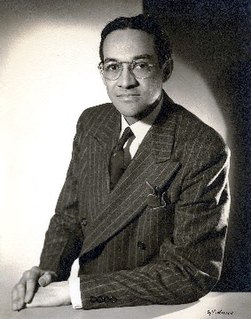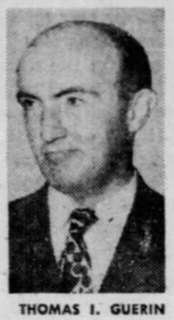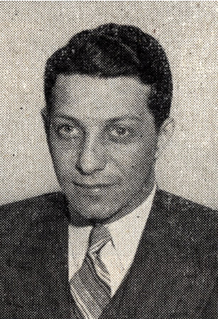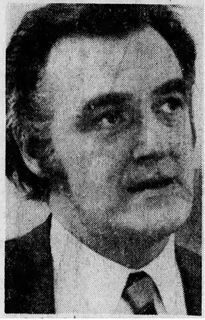
Victor Edward Moore (November 13, 1897 - August 22, 1982) was a Philadelphia businessman and Democratic politician. He served three terms on the Philadelphia City Council and as chairman of the Philadelphia Gas Works.

Victor Edward Moore (November 13, 1897 - August 22, 1982) was a Philadelphia businessman and Democratic politician. He served three terms on the Philadelphia City Council and as chairman of the Philadelphia Gas Works.
Moore was born in Illinois in 1897. After moving to Philadelphia as a child, he attended West Philadelphia High School, where he excelled in baseball and football. [1] While attending the University of Pennsylvania, he also took up rowing, which became a lifelong pursuit. [1] Through rowing, Moore became associated with John B. Kelly Sr., the Olympic medallist and Democratic politico. [2] In 1935, he was elected president of the Schuylkill Navy's Malta Boat Club. [3] He also became successful in the tool and equipment business. [2]
Through his connections with Kelly, Moore became involved in local politics, being appointed executive secretary of the Democratic City Committee in 1940. [2] The following year, Governor Arthur H. James appointed Moore as a Democratic member of Philadelphia's new bipartisan Registration Commission. [4] Later that year, Moore was the subject of a write-in campaign for mayor, which city officials declared invalid. [5] After World War II began, he became involved in the Civil Defense Corps. [6] In 1943, there was a grand jury investigation of the Registration Commission, which Moore called a "fishing expedition." [7] No charges were brought, and in 1945 Governor Edward Martin reappointed the entire board, including Moore. [8] He was among the group of investors that bought the Philadelphia Eagles in 1949. [1] In 1951, Michael DiSalle appointed Moore to a temporary post with the Korean War-era Office of Price Stabilization, a federal agency devoted to price controls. [2]
Later that year, after Philadelphia adopted a new city charter, Moore ran for an at-large seat on the reformed city council. [9] He was elected, part of a wave election that swept the Republicans from power for the first time in 67 years. [10] Moore won the highest vote total of any of the seven at-large candidates elected. [10] In Council, he chaired the Transportation and Public Utilities Committee. [11] In 1952, just a year after the city charter's adoption, Moore called for revisions to it that would take certain powers from appointed officials and return them to City Council. [12] That same year, he advocated tearing down Philadelphia's City Hall and replacing it with a modern office building (the proposal was not adopted). [13]
Moore resisted calls from Democratic Mayor Joseph S. Clark Jr. to increase the city budget and raise taxes, proposing a budget smaller by $19 million. [14] Clark's budget eventually passed Council without Moore's vote. [15] Moore continued to oppose Clark and the charter, joining the efforts James Hugh Joseph Tate and Michael J. Towey to weaken the charter's civil service reforms (they were unsuccessful). [16] He was re-elected in 1955, again leading all candidates for at-large seats. [17] In the next council session, Moore became chairman of the Finance Committee. [18]
On the Finance Committee, Moore developed a reputation as the city's "financial watchdog" as he scrutinized spending requests from the new mayor, Richardson Dilworth. [19] He served as Council's representative on the Philadelphia Transportation Company's board of directors, and fought for the construction of the Delaware Expressway. [1] In addition to fighting tax increases, Moore and Tate worked to keep utilities costs from increasing excessively. [20] In 1958, Moore considered a run for Lieutenant Governor, but changed his mind when Clark, now a United States Senator, blocked the Democratic Party establishment from endorsing him. [21] Instead, he ran for a third term on City Council in 1959, and garnered the second-most votes of any at-large candidate. [22]
In 1960, Moore investigated waste within the Philadelphia Gas Works. [23] At the same time, he found himself (and fellow Councilman John F. Byrne, Sr.,) under investigation after campaign contribution pay-to-play allegations concerning work done by city contractors to rebuild the Market-Frankford Elevated Line. [24] He resigned from Council in 1962 to become chairman of the Gas Works, where he promised to root out waste and corruption. [1] The grand jury investigation led to an indictment in 1963, but Moore was found not guilty. [25] He resigned from the Gas Works post in 1965 and retired to Florida in 1967. [1] He remained there until 1982, when he died and was buried in West Palm Beach's Woodlawn Cemetery. [1]

Raymond Pace Alexander was a civil rights leader, lawyer, politician, and the first African American judge appointed to the Pennsylvania Courts of Common Pleas. In 1920, he became the first black graduate of the Wharton School of Business. After graduation from Harvard Law School in 1923, Alexander became one of the leading civil rights attorneys in Philadelphia. He represented black defendants in high-profile cases, including the Trenton Six, a group of black men arrested for murder in Trenton, New Jersey. Alexander also entered the political realm, unsuccessfully running for judge several times. He finally ran for, and won, a seat on the Philadelphia City Council in 1951. After two terms in City Council, Alexander was appointed as the first black judge to sit on the Court of Common Pleas, where he served until his death in 1974.

Constance Hopkins Snow Dallas was an American politician. A member of the Democratic Party, she served on the Philadelphia City Council as a representative of the city's 8th district. Born in New York and educated in Europe, Dallas came to Philadelphia as a teenager. After marriage and raising children, she entered local politics as a reform-minded Democrat. Following an unsuccessful run for City Council in 1947, she was elected in 1951, the first woman to serve in that legislative body.

Harry Norwitch was an organized labor leader and Democratic politician from Philadelphia.

Philadelphia's municipal election held on November 6, 1951, was the first under the city's new charter, which had been approved by the voters in April, and the first Democratic victory in the city in more than a half-century. The positions contested were those of mayor and district attorney, and all seventeen city council seats. There was also a referendum on whether to consolidate the city and county governments. Citywide, the Democrats took majorities of over 100,000 votes, breaking a 67-year Republican hold on city government. Joseph S. Clark Jr. and Richardson Dilworth, two of the main movers for the charter reform, were elected mayor and district attorney, respectively. Led by local party chairman James A. Finnegan, the Democrats also took fourteen of seventeen city council seats, and all of the citywide offices on the ballot. A referendum on city-county consolidation passed by a wide margin. The election marked the beginning of Democratic dominance of Philadelphia city politics, which continues today.

Philadelphia's municipal election of November 8, 1955, involved contests for mayor, district attorney, all seventeen city council seats, among other offices. Citywide, the Democrats took majorities of over 130,000 votes, continuing their success from the elections four years earlier. Richardson Dilworth, who had been elected district attorney in 1951, was elected mayor. Victor H. Blanc, a city councilman, was elected district attorney. The Democrats also kept fourteen of seventeen city council seats, losing one district seat while gaining another, and kept control of the other citywide offices. The election represented a further consolidation of control by the Democrats after their citywide victories of four years earlier.

Thomas Ignatius Guerin was a Democratic lawyer and politician from Philadelphia.

Samuel Rose was a Democratic lawyer and politician from Philadelphia.

Michael John Towey was an organized labor leader and Democratic politician from Philadelphia.

Philadelphia's municipal election of November 3, 1953, was the second held under the city charter of 1951 and represented the first test of the Democratic city government of Mayor Joseph S. Clark Jr. In the 1951 election, the voters had elected a Democratic mayor for the first time in 67 years, breaking the Republican hold on political power in the city. They had also elected a majority-Democratic City Council along with Democrats for district attorney and other citywide offices. In 1953, the voters had the chance to continue the Democratic trend or to block it in the election for City Controller, Register of Wills, and various judges and magistrates. On election day, the Republican organization recovered from their 1951 losses, electing all their candidates citywide. Republicans celebrated the victory, but subsequent Democratic triumphs in the 1955 and 1959 elections made the 1953 result more of an aberration than a true comeback for the once-powerful Philadelphia Republican machine.

Philadelphia's municipal election of November 5, 1957, involved the election of the district attorney, city controller, and the remainder of a term for one city council seat, as well as several row offices and judgeships. Democrats were successful citywide, continuing a run of victories racked up after the passage of a new city charter in 1951 despite growing divisions between factions of the party. Victor H. Blanc, the incumbent district attorney, led the Democratic ticket to victory. They held the city council seat and took two citywide offices that Republicans had won in 1953. In the judges' elections, most were endorsed by both parties but in the one race that pitted a Democratic candidate against a Republican, the Democrats were successful in seating their candidate, former Congressman Earl Chudoff.

Philadelphia's municipal election of November 3, 1959 involved contests for mayor, all seventeen city council seats, and several other executive and judicial offices. Citywide, the Democrats took majorities of over 200,000 votes, continuing their success from the elections four years earlier. Richardson Dilworth, who had been elected mayor in 1955, was re-elected over Republican nominee Harold Stassen. The Democrats also took fifteen of seventeen city council seats, the most seats allowed to any one party under the 1951 city charter. They further kept control of the other citywide offices. The election represented a continued consolidation of control by the Democrats after their citywide victories of the previous eight years.

Marshall Lorenzo Shepard, Sr. was an American Christian clergyman and politician. Affiliated with the Democratic Party, his political career was focused in the city of Philadelphia.

Philadelphia's municipal election of November 7, 1961, involved the election of the district attorney, city controller, and several judgeships. Democrats swept all of the city races but saw their vote totals much reduced from those of four years earlier, owing to a growing graft scandal in city government. District Attorney James C. Crumlish, Jr. and City Controller Alexander Hemphill, both incumbents, were returned to office. Several ballot questions were also approved, including one permitting limited sales of alcohol on Sundays.

Alexander Hemphill was a Democratic lawyer and politician from Philadelphia who served as City Controller from 1958 to 1968. After service in World War II and graduation from the University of Pennsylvania Law School, Hemphill embarked on a legal career before running for office. In his three terms as city controller, he exposed corruption and malfeasance, often to the discomfort of his fellow Democrats. He ran for mayor of Philadelphia in 1967 against the incumbent Democrat, James H. J. Tate, but was unsuccessful, and retired to a private law practice until his death in 1986.

Foster Alexander Dunlap was a Republican lawyer and politician from Philadelphia who served as City Controller from 1954 to 1958.

Philadelphia's City Council special election of 1962 was held to fill three vacant city council seats. The first was in the 8th district, when Democrat Alfred Leopold Luongo was appointed to the federal bench in September 1961. A second vacancy that same year occurred in the 10th district when Democrat John M. McDevitt resigned in June 1962 to become a Catholic priest. An at-large seat also became vacant when Victor E. Moore resigned in September 1962 to become the head of the Philadelphia Gas Works. Special elections were scheduled for November 6, 1962, to be held at the same time as the federal and gubernatorial elections that year. Democrats held two of the seats but lost the 8th district to a Republican.

Philadelphia's municipal election of November 5, 1963, involved contests for mayor, all seventeen city council seats, and several other executive and judicial offices. The Democrats lost vote share citywide and the Republicans gained one seat in City Council, but the Democratic acting mayor, James Hugh Joseph Tate, was elected to a full term and his party maintained their hold on the city government. The election was the first decline in the Democrats' share of the vote since they took control of the city government in the 1951 elections, and showed the growing tension between the reformers and ward bosses within their party.

Austin Andrew Meehan, Sr., was a Republican politician in Philadelphia who served as county sheriff. Before entering politics, Meehan ran his family's paving business and was known as a local basketball star. Beginning as an insurgent within the city's Republican Party, he soon won the favor of party bosses and climbed the ranks of Philadelphia's Republican organization. Meehan served two terms as county sheriff from 1944 to 1952 and was recognized as the unofficial head of the Republican Party in Philadelphia in the 1950s. He remained an influential party member until his death in 1961.

Walter Stanley Pytko was a Democratic politician from Philadelphia. Active in Polish-American groups in Philadelphia's Bridesburg neighborhood, Pytko also became involved in local politics. He served one term in the Pennsylvania State Senate in the 1930s and worked in various government agencies through the 1940s and 1950s. In 1962, he was elected to the Philadelphia City Council, where he served until retiring in 1968.

James T. McDermott was a Pennsylvania judge and politician who served on the state's Supreme Court from 1981 until his death in 1992. Before joining the court, he was active in Philadelphia politics as a Republican candidate for Congress in 1958, city council in 1962, and mayor in 1963. He was a trial court judge on the Court of Common Pleas from 1965 to 1981.